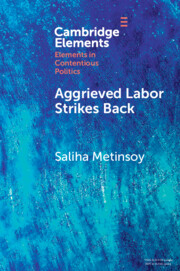Element contents
Aggrieved Labor Strikes Back
Published online by Cambridge University Press: 03 April 2024
Summary
- Type
- Element
- Information
- Series: Elements in Contentious PoliticsOnline ISBN: 9781009455749Publisher: Cambridge University PressPrint publication: 09 May 2024



